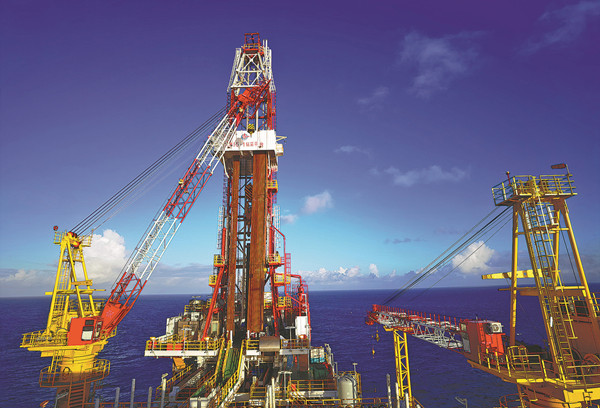
Haiji One, Asia's first deep-water jacket designed and built independently by China National Offshore Oil Corp, is put into operation in the Pearl River Mouth Basin, more than 200 kilometers southeast of Shenzhen, Guangdong province, in October. [CHEN WEN/CHINA NEWS SERVICE]
Oil and gas exploration to rise; sector's 2022 crude output up 7% to 58.6m tons
China's investment in offshore oil and gas exploration is expected to continue rising, with more than half of this year's domestic oil increment likely to have come from offshore, according to a recent report released by China National Offshore Oil Corp.
This year's data are expected to show that China has harnessed more domestic energy from offshore resources, hitting a record high. The country's offshore crude production will also show a nearly 7 percent year-on-year rise this year to an estimated 58.6 million metric tons, accounting for more than 50 percent of the county's total crude increment, according to the China Offshore Energy Report drafted by the CNOOC Energy Economics Institute.
Offshore natural gas production this year will exceed 21.6 billion cubic meters, up 8.6 percent year-on-year, making up around 13 percent of the country's gas increment, it said.
The institute estimates China's offshore oil production will exceed 60 million tons in 2023, and lead domestic oil production increment, while offshore natural gas production is also expected to exceed 23 billion cubic meters next year.
According to Wang Zhen, head of the institute, this year is set to prove a major breakthrough in China's oil and gas exploration and exploitation, with seven new offshore oil and gas discoveries made in China.
"Growth in the oil and gas sector will come mostly from offshore resources in China, which is expected to become an important energy growth driver in the years to come," he said.
The company said China's offshore crude increment last year accounted for more than 80 percent of the country's total growth volume, a record high, while the exploitation of offshore natural gas resources is steadily advancing toward even deeper waters.
Li Ziyue, an analyst with BloombergNEF, said he believes China's offshore oil and gas production is expected to continue rising during the 2022-24 period, while its continuous upstream investment and production commitment will also play a critical role in China's energy supply security.
The institute said that renewable energies are also seeing more opportunities in the offshore sector, as offshore wind has been developing on a large scale in the country.
It estimates that China's offshore wind power installed capacity will reach 32.5 million kilowatts by the end of this year, accounting for almost half of the globe's total of 68.5 million kilowatts.
The country has come up with several industrial clusters so far in the Pearl River Delta region and Yangtze River Delta region, it said.
As China has been developing a green and low-carbon energy transition on a large scale, the offshore wind power will account for almost 20 percent of China's coastal regions' power consumption in 2050, up from the current 2 percent, it said.
According to the institute, China's dependence on crude oil and natural gas imports will further drop this year. It estimates that domestic crude production will reach 205 million tons this year, exceeding 200 million tons for the first time since 2016. Natural gas production in the country is expected to rise to 221.1 billion cubic meters, up 6.5 percent over 2021, it said.
The country's reliance on crude oil imports has dropped for the first time in the past two decades in 2021, from 73.6 percent in 2020 to 72 percent in 2021, official data showed.
According to Wang Dongjin, chairman of CNOOC, the company's oil and gas production is expected to rise more than 6 percent each year during the 2022-24 period, while the company will also roll out a new energy industry strategy to enhance its position as the country's top offshore oil and gas driller.
The company will conduct oil exploration, focusing on increasing capacity and storage of oil and gas, and adopting advanced technologies to bolster China's energy security and reduce its reliance on foreign energy resources, Wang said.